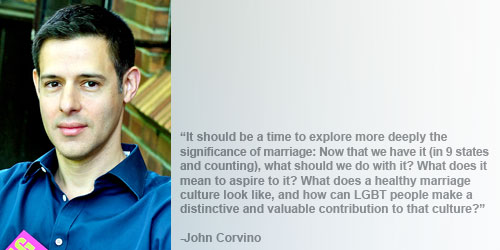By John Corvino

A couple of years ago I was chatting with a gay literary agent in a downtown Manhattan cafe. Our conversation turned to the book I was working on, Debating Same-Sex Marriage. "Debating same-sex marriage?" he scoffed. "I mean, really: What's left to argue?"
Note that, at the time of the conversation, same-sex marriage was still illegal in New York, as in 44 other states. What's more, pro-equality forces had lost in every single state (nearly 30 at the time) where marriage had been on the ballot. And there had been a rash of news stories in the preceding months about gay teen suicides, typically in the wake of bullying and harassment.
Yet my New York friend could ask with a straight face, "What's left to argue?" I remember thinking to myself: He really needs to get out of Chelsea once in a while.
You might object that I'm being uncharitable. Perhaps he just meant that for him (and for sane people everywhere!) the answer is obvious. But I couldn't help but detect a worrisome sentiment: We don't need to expend energy on securing marriage rights, because we've got the issue pretty well wrapped up.
That sentiment has been growing with the positive momentum in the last two years. In 2011, New York gave same-sex couples the freedom to marry. In 2012, President Obama announced his support of marriage equality. And in the recent November election, three states (Maine, Maryland, and Washington) extended marriage to same-sex couples by popular vote, while a fourth (Minnesota) blocked on anti-gay marriage amendment.
Given our record at the ballot box, any one of these November victories could have been considered a game-changer. Taken together, they signal a dramatic shift. Combine them with the fact that marriage equality is part of the Democratic Party's national platform and that an increasing number of Republicans are favoring it, and there's reason to be jolly this holiday season.
Make no mistake, however: These victories happened because of hard work, and there's much work left to be done.
While polls show a majority of Americans supporting marriage equality, it's not a huge majority. Indeed, it's barely more than 50 percent. It's smaller among older Americans (who also happen to be the Americans most likely to vote), smaller in "red states," and smaller among the devoutly religious.
There are still 41 states that won't grant us marriage licenses.
In the coming year, the U.S. Supreme Court will consider challenges to California's Prop. 8 and to the Defense of Marriage Act. Aside from the justices (and maybe Mrs. Kennedy), no one knows how these cases will turn out.
Let's imagine that, contrary to most expectations, the Court rules broadly that the U.S. Constitution requires that all states grant equal marriage rights to same-sex couples. Not just in California, but everywhere: Michigan, North Dakota, even Mississippi. Imagine that, in one fell swoop, dozens of anti-gay marriage bans were declared unconstitutional.
Even then, there'd still be plenty left to argue, and not only because of the inevitable backlash.
The reason is simple: marriage is not merely a legal institution; it's also a social one. As I've said many times (and the point bears repeating): It's one thing for the state to let you marry; it's another for your family to show up at your wedding and be happy for you. Both elements are important.
The social progress on gay rights has in some ways been even more impressive than the legal progress. When I came out in the late 1980s, most people claimed never to have met a gay person. Today, such isolation is rare.
And yet I still meet young people who are estranged from their families because of their sexual orientation or gender identity. I meet adults who live much of their lives in the closet. I meet LGBT people and allies who, despite a strong commitment to equality, feel a residual shame.
For these reasons, I see 2013 as an opportunity to return to debates that have, in many circles, been relegated to the back burner: a time to argue, not only for equal legal access, but also for equal moral respect.
It should also be a time to explore more deeply the significance of marriage: Now that we have it (in 9 states and counting), what should we do with it? What does it mean to aspire to it? What does a healthy marriage culture look like, and how can LGBT people make a distinctive and valuable contribution to that culture?
We have much to be proud of, and much to be thankful for. We also have much left to do.










